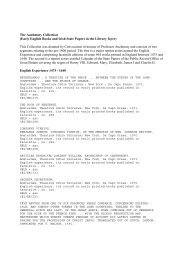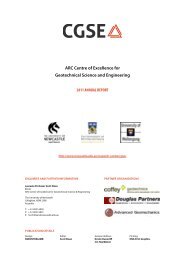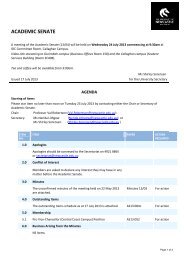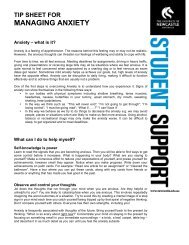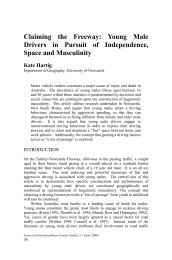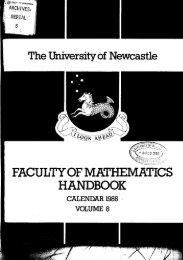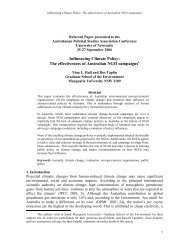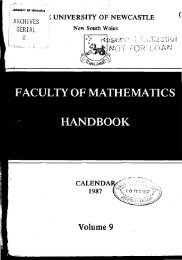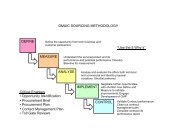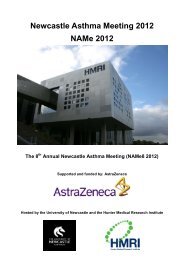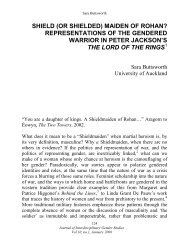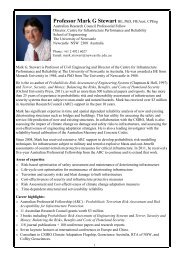n - University of Newcastle
n - University of Newcastle
n - University of Newcastle
You also want an ePaper? Increase the reach of your titles
YUMPU automatically turns print PDFs into web optimized ePapers that Google loves.
63 AN AUSTRALIAN LANGUAGE.<br />
The conjngations <strong>of</strong> certain letters may occasionally, but rarely,<br />
cause the general roles to be violated for the sake <strong>of</strong> euphony ;<br />
thus, the verb mugha has in the perfect tense mugaigngn, not,<br />
as might be expected, mugaguan, no doubt, on account <strong>of</strong> two<br />
' g's7 being so near each other.<br />
4. MODIFICATIO~~ OF THE VERB.<br />
A chai.acteristic feature ancl peculiarity <strong>of</strong> this aboii,&al dialect<br />
is the use <strong>of</strong> numerous postfixes. By meails <strong>of</strong> these, the<br />
llouil shows an unnsual number <strong>of</strong> cases, which supply in a certain<br />
measure the absence <strong>of</strong> our prepositions. In a similar manner, the<br />
verb takes additions or changes <strong>of</strong> its fom, by which new forms<br />
it expresses its modified significations according to the various<br />
relations in which the simple verb may be placed. These tend to<br />
enrich the language considerably, since the moclified ideas impliecl<br />
in them <strong>of</strong>ten produce quite a new kind <strong>of</strong> worc1 or signification.<br />
As new verbs, they may be adjusted to some one or other<br />
<strong>of</strong> the examples already given, agreeably to their terminations.<br />
Hence they can never be supposed to be merely conjugations.<br />
For the sake <strong>of</strong> convenience, I shall carry one verb through<br />
the modifications, though it cannot be expected that all verbs are<br />
used or needecl in every modification. I will take the root-form<br />
buma, 'beat,' as the chief example <strong>of</strong> these modifications, but<br />
another suitable one will be always adcled.<br />
Some <strong>of</strong> the postfixes in those examples hare doubtless lost or<br />
changed their original signification in certain 1-erbs.<br />
Exanyles <strong>of</strong> the use <strong>of</strong> Szc$ixes to nzod;;fy the nzenlzilzy <strong>of</strong> J7erbs.<br />
1. Bianna, 'a constancy <strong>of</strong> action'; as, bumal-bianna, 'to<br />
be always beating '; ga-biann a, 'to be always looking.<br />
2. Gunnanna, ' a present continuance <strong>of</strong> action '; as, bumal-<br />
gunnanna, 'to be now beating'; ga-gunnanna, 'now looking<br />
on.'<br />
Both <strong>of</strong> these are used for our participle, bnt in a definite and indicative<br />
way ; but as, like other verbs, they are conjugated, and never employed as<br />
adjectives, they cannot be considered as participial forms, but only as<br />
modifications <strong>of</strong> the verbs.<br />
3. Awaigunnanna, 'a long continuance'; as, bumal-awai-<br />
gunnanna, 'to be beating a long time '; gagawaigunnanna,<br />
'to be looking on long.' This does not much differ from No. 2.<br />
4. Garrimzna, 'a continuance <strong>of</strong> all day long'; bumal-gar-<br />
rimiina, 'to be beating all day long'; bunba-garrimha, 'to<br />
run about all day long.'<br />
5. Guabianna, ' a continuance for the night '; bumallai-<br />
guabianna, ' to beat (fight) all the night '; winai-guabianna,<br />
' to sit up all night.'<br />
6. Dillinga (rejezive); as, bumangi-dillinga, 'to beat one's<br />
self '; mirama-dillinga, 'to defend one's self.'<br />
THE WIBADHARI DIALECT.<br />
7. Lann a (reci~~~ocal)<br />
; as, bnmal-lanna,' to beat each other,'<br />
'to fight '; nnrungamil-lanna, 'to love each other.'<br />
8. Alinga (reiterative); as, bumal-alinga, 'to beat again';<br />
y annai-alinga, ' to go again.'<br />
9. Numinga implies that an action is to last for a little time<br />
only before another ; as, bum al-numinga, ' to beat previously ';<br />
ganuminga, ' to see beforehand.'<br />
10. &Tam b ir r a is causative and permissive ; as, bum ali-ma m-<br />
birra, 'to let beat'; yal-mambirra, 'to cause one to speak,'<br />
'to teach.'<br />
11. Gambirr a, instrumental ; meaning that a thing has been<br />
clone by means <strong>of</strong> an instrument, tool, 01- weapon ; as, bum al-<br />
gambirra (not used) ; bangal-gambirra, 'to break by throw-<br />
ing at (or hitting) with something.'<br />
12. Billing a, submissive ; expressive <strong>of</strong> obedience to a corn-<br />
mand; as, buma-billings, 'to beat when tolcl or ordered';<br />
yanna-billings, 'to go when ordered <strong>of</strong>f.'<br />
13. Eilinga iniplies a vicaiious action-an action done on<br />
behalf <strong>of</strong>, or instead <strong>of</strong>, another ; as, bum-eiling a, ' to beat in-<br />
steacl <strong>of</strong> another'; barram-eilinga, 'to get or provide for<br />
another.'<br />
14. Duringa seems to intimate achange <strong>of</strong> action, the turning<br />
<strong>of</strong> one's attention from one thing to another, or to do a thing<br />
well and thoroughly; as, bumal-cluringa, ' to leave <strong>of</strong> the pre-<br />
sent act <strong>of</strong> beatino'. minnanga-duringa, 'to forget,' ' to think<br />
<strong>of</strong> something else'; " to reflect.'<br />
15. Wanna probably signifies an aim at 09. a purpose to clo a<br />
thing ; or rather, to act in a kincl <strong>of</strong> series <strong>of</strong> doings, one after<br />
another, going all round, or to be just in the act <strong>of</strong> doing ; as,<br />
bumalla-wanna, 'tobeat one after another'; yannaia-manna,<br />
' to walk away,' ' to walk from one place to another.'<br />
16. Danna means the resuming <strong>of</strong> an action after having<br />
taken refreshment ; as, bum al-clanna, ' to beat agin ' after<br />
eating ; bu mba-clanna, ' to run <strong>of</strong>f again ' after a little refresh-<br />
ment.<br />
17. Gilanna inclicates a kind <strong>of</strong> dual action ; as, bumalu-<br />
gilafina, 'two to beat together at once '; bumban-gilanna, ' two<br />
to run t,ogether.'<br />
18. Y arra is the verb ' to speak'; it 6an be put or joined to any<br />
verb as a postfk, and is then expressive <strong>of</strong> a command; ' ba' is<br />
put between as a uniting syllable; thus, yanna-ba-yarra, 'to<br />
order to go', ' to send away '; bumal-ba-g arra, ' to tell to beat.'<br />
19. Birra, nirra, dirra, banirra, bamarra, bunmarra;<br />
these particles, when joined to a neuter or an intransitive verb,<br />
give it a transitive and causative signification; thus, from<br />
gannarra, ' to burn,' is formed gannal-birra, 'to set on fire';<br />
ballunna, 'to die' gives ballubunirra, 'to kill'; banganna,<br />
63



